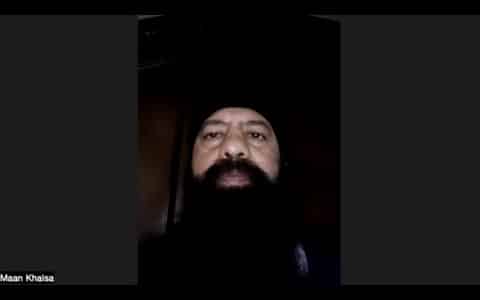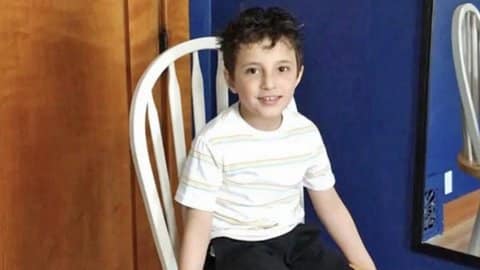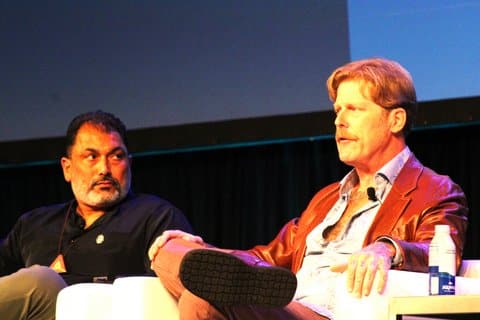
25 Sep Q&A: Sikh Richmond Man Reflects Seven Years After Brutal Hate Crime Attack

Maan Singh Khalsa, seen here on a Zoom interview earlier this month, was attacked in a hate crime on Sept. 25, 2016. (Screenshot captured by Danielle Parenteau-Decker / The CC Pulse)
Interview, Danielle Parenteau-Decker
Maan Singh Khalsa was stopped in his car while driving in Richmond on Sept 25, 2016, when two Texas men, then aged 25 and 31, attacked him. They punched him and used a knife to saw off his hair, stabbing him in the right hand as he tried to protect his head, which led to the partial amputation of his pinky finger. Khalsa is Sikh, so his faith calls on him to never cut his hair. The two men, Colton Tye LeBlanc and Chase Little, pled no contest to felony aggravated assault and hate crime charges and were sentenced to three years in prison, though they served less time.
Recently, Khalsa sat down with The CC Pulse to take a look back at the aftermath of the attack and to share what things have been like for him in the years since. This conversation has been lightly edited.
The CC Pulse: Do you still deal with feelings of depression or anxiety because of what happened to you?
Maan Singh Khalsa: Yes. Every time I pass over the overpass where the incident happened — it just comes to me that that’s where it all happened, so I try to avoid it, but you know, I still live here, so every time I go there, it (brings) up things. Other than that, emotionally, I am OK, stable, but I do get frustrated. I don’t know if you want to call that depression, but I do get frustrated because I’m dropping things, my phone, screens break, glasses break when they fall from my hand…. Trying to tie my turban, my arm turns numb. Holding things for a little bit, my arm doesn’t support that, so my arm turns numb. That frustrates me.
RP: Are there any other physical or psychological effects you’re still experiencing?
MSK: Not much besides where the pinky finger is, that arm turns numb doing things. It’s very tingly, so I can’t have a grip, and if I’m driving, holding the steering wheel for a while, my right arm turns numb. My wife is telling me that my memory is affected, definitely short-term memory. I forget things and still drop things because of my missing pinky finger.
RP: After you were attacked, were there sources of support — people or organizations — that you were able to turn to at that time that helped you?
Maan Singh Khalsa: There was crowdfunding. I got about $10,000 from there. That helped.
RP: Who started that?
MSK: Somebody in the community.
RP: Have there been any organizations that have been helpful to you?
MSK: No.
RP: Did you try to find somewhere and couldn’t?
MSK: No, actually, there were some organizations within our community that used my pictures and other stuff to raise funds for awareness, but they didn’t help me. They didn’t reach out to me. They took my pictures, (but) they wouldn’t help. They don’t ask. They just use pictures and collected several thousand dollars from the public. They … raised awareness of violence against Sikhs or something like that, but they didn’t even ask me or reach out to me. No help.
RP: Have there been any resources that actually did help you?
MSK: No, nobody helped me. For my eye, I still go see the doctor… It still flares up from time to time because that’s where they hit me, so some nerves, there’s damage. … Stress or stuff like that, it flares up, and it all turns red. But other than that, I’m all good now.
RP: When things do get hard, what are some things help you cope?
MSK: There’s nothing like that. I mean, it’s hard to explain. I’m OK. I can say that. I’m just getting through things. But I don’t know how to answer or explain that. Everything is OK. It’s just my wife and I. She’s very helpful and supportive in every way.
RP: Are there other people or anything else in your life that helps you cope?
MSK: My meditation that I do every day, my prayers morning and evening. That definitely helps. Other than that, I’m not much involved in the community anymore. We’re keeping to ourselves. It’s basically shut me off from everything. That’s what happened. ’Cause I used to be working for a nonprofit and going, traveling everywhere. I stopped doing that and just stay home.
RP: Can you talk more about how your faith has helped you and how it affected how you responded to the attack?
MSK: Sikhism is a very profound religion. Like every other religion, they guide people. Our holy book, the Guru Granth Sahib, is the life guru. If you read that, basically, you have a question in your mind, you’ll get the answer if you read it wholeheartedly. It walks you through every part of your life, so when you’re down, it builds you up. It gives you strength. … It’s very encouraging if you read the holy book because it’s like you’re talking to your guru. … I go to El Sobrante, the Sikh temple, sometimes … They do early morning meditation. Sometimes, I go in Fremont. That charges you up. … They do meditation or singing with a lot of congregation of people. That definitely helps. It’s a great vibe with the music and singing the hymns. … If something happens to you, it’s for a reason even if you’re beaten or down; it’s like a test from the god that gets you through that. Something better will come up. I haven’t read the Bible but in the Bible, they say lot of things similar. If you look at all religions, you look at the similarities to guide people through their life during hard times, to build character, not to differentiate this religion as better, that is better. The similarities, that’s what you should look at. And all people are same. We’re all children of God. The Bible says God created human in his own image, and similarly in our holy book, Guru Granth Sahib, the sentence is that the soul is the same as the light as the god. So it’s the same thing, basically same principles. Every religion teaches love of humanity, but people, I don’t know how they get so (much animosity) in them, jealous (of) other people … Nature is diverse, so are human beings, but basically, they all have the same thing, same light, same energy, so I don’t know why so much animosity.
>>>Read: A Neighborhood Market with Roots in India
RP: Nowadays, do you feel like people treat you badly because of your religion or how they see you?
MSK: Once in a while, very rare, but people are more aware now about the Sikhs and the Muslims and all, but you know, human beings are human beings. You can’t change them (laughed), but it’s your perspective. It should always be positive. You should always stay positive. That’s what I learned from reading our holy book. What keeps me going is staying positive.
RP: Are there other ways that you’d like to talk about in which your life changed as a result of the attack?
MSK: Yes. I’m not as active, physically, as I used to be, going out, running, doing things. Things change, definitely. I wish I could be back to the way I was, but this is life, so you got to adapt, keep going.
RP: You had once said to your attackers, “I still consider you my brothers.” Do you still feel that way, and is there anything now that you would like to say to them?
MSK: You know, I’ve forgotten all that. It was an incident that happened as a bad dream. Nothing against them. They’ve done what they did. They were not in (their right mind) because they were drunk and there were also a lot of hate going on especially with the Trump era coming up — I don’t know what was going on with people’s minds, but that phase has gone. People are more sensitive now. They’re more compassionate. … I’ve forgiven them. Things happen. We move on. We learn from our mistakes. … They suffered a lot as well, I believe. They lost their jobs, and they served some sentence in the prison. They were sentenced for three years, served year and a half. I wish them good luck in their life. I have no hard feelings for them anymore.
RP: I know this can’t be easy to talk about, but is there anything else you would like to say?
MSK: I would just like to tell everybody, no matter whether it’s India, whether it’s America or any other country, people should live peacefully and harmoniously… God’s message to everybody is to serve humanity. There’s so much misery in people’s lives, and if you’re in a comfortable position, you should help them out. No matter caste or religion or the community, whatever they are, all humans are alike. So if you can, you should help out every human being you can. That’s my only message is serve humanity. Be friendly. Don’t be (hostile) to anybody. Just show love to everybody.
Any victim of or witness to a hate incident or crime in California can report it and receive support any time at CAvsHate.org. You can also call 833-8-NO-HATE; (833) 866-4283 Monday – Friday from 9:00 am – 6:00 pm. If outside of those hours, you can leave a voicemail, or you can call 211 to report hate and seek support. You can currently submit reports online in 15 languages and, when calling the hotline, you can get access to support in over 200 languages. If you want to report a hate crime to law enforcement immediately or you are in present danger, please call 911.
This resource is supported in whole or in part by funding provided by the State of California, administered by the California State Library in partnership with the California Department of Social Services and the California Commission on Asian and Pacific Islander American Affairs as part of the Stop the Hate program. To report a hate incident or hate crime and get support, go to CA vs Hate.





No Comments